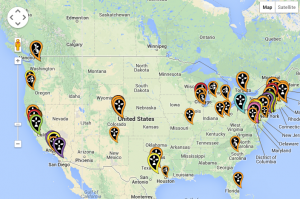Earth-Based Jewish Practices Subscribe
A selection of initiatives, blogs, resources and communities on Jewcology which focus on earth-based Jewish practices.
From the Blogs
Earth Etude for Elul 3 – Let it Rest
Earth Etude for Elul 3 - Let It Rest by Carol Reiman Let it rest-- the land that we have worked so hard, the grassy fare for geese now taken by the high tech labs, the water diverted far away to leave the old spot bare, the day diminished by our dense cramming, electronics robbing our eyes of moisture... Let it rest-- the fish sleep still near the bottom, the standing horse relaxes muscles, the cat stretches and curls... Let it rest-- the yawn exchanges stale air for fresh, cells grow, the blood flows with its passengers for new destinations, ...
Tisha B’Av and Vegetarianism
Jews can enhance their commemoration of the solemn but spiritually meaningful holiday of Tisha B'Av by making it a time to begin striving even harder to live up to Judaism's highest moral values and teachings. One important way to do this is by moving toward a vegetarian diet. Please consider: 1. Tisha B'Av (the 9th day of the month of Av) commemorates the destruction of the first and second Temples in Jerusalem. Today the entire world is threatened by destruction by a variety of environmental threats, and modern intensive livestock agriculture is a ...
Is it Jewish to be Green?
To many this may seem to be a stupid, or rather a redundant question: Should Jews support democracy, freedom of speech and freedom of worship? I am sure that no one will dispute the fact that climate change, alongside the dwindling of the world's resources, constitutes one of the burning issues of our time. So let me rephrase the question: Should we be committed environmentalists because we are Jews, and does our faith and its practices prescribe our undertaking to address these issues, as part of our obligation to repair the world? Click here to continue ...
Get Your Hands Dirty at the Nevatim-Sprouts Conference!
Nature-Based Workshops for Educators in Jewish Preschools, Day Schools and Synagogues Reisterstown, MD – May 5, 2014 -- Pearlstone Center is holding its 4th annual Nevatim-Sprouts Conference, Sunday, July 13th through Wednesday July 16th. This professional development conference brings together early childhood, day school, and religious school educators from around the country for training in Jewish garden and environmental education. Participants learn the basics of educational garden design, share lesson plans and Jewish, environmental curricula, tour the ...
Join Jewcology at the Teva Seminar!
Jewcology is proud to be a partner in the 20th Annual Teva Seminar on Jewish Outdoor, Food, and Environmental Education! Monday, June 9 – Friday, June 13, 2014 at Isabella Freedman Jewish Retreat Center Join us for a week dedicated to renewing our relationship with the earth, gaining garden education skills, and studying eco-Torah. The Teva Seminar is the premier annual professional development opportunity in the field of JOFEE: Jewish Outdoor, Food, and Environmental Education. Featuring leaders in the JOFEE field: Nili Simhai, Mordechai Leibling, Jakir ...
The Seder’s Innermost Secret — Charoset: Earth & Eros in the Passover Celebration
There it sits on the Seder plate: charoset, a delicious paste of chopped nuts, chopped fruits, spices, and wine. So the question would seem obvious: "Why is there charoset on the Seder plate?" That's the most secret Question at the Seder – so secret nobody even asks it. And it’s got the most secret answer: none. The Haggadah explains about matzah, the bread so dry it blocks your insides for a week. The Haggadah explains about the horse-radish so bitter it blows the lid off your lungs and makes breathing so painful you wish ...
The Vegetarian Views of the Rav
Joseph Ber (Yosef Dov) Soloveitchik, affectionately known as the Rav (generally pronounced Ruv), was generally regarded as one of the leading philosophers, Talmudic scholars, and Jewish leaders of the 20th century. He stressed that Torah values were compatible with world culture and secular studies and promoted Jewish interaction with the broader community. The Rav was regarded as a seminal figure in the modern Orthodox community. Over a nearly 50-year career, he ordained almost 2,000 Orthodox rabbis, and served as a mentor, guide, and role model for tens of thousands ...
Will Scandal at Israeli Slaughterhouse Change Jews’ Diets?
"We will not tolerate giving kashrus supervision to a factory that ignores animal cruelty issues." This statement by the recently elected Ashkenazi Chief Rabbi of Israel David Lau, along with his promise to look into the kashrus status of facilities where abuses of animals occur, has the potential to greatly change the ways that animals are raised and slaughtered, as well as the eating habits of Jews. Chief Rabbi Lau expressed his outrage and concerns after seeing a video shown on Israeli television’s channel 10 Kolbotek program on October 29. The video had underc...
Chanukah and Vegetarianism
Jews can enhance their celebrations of the beautiful and spiritually meaningful holiday of Chanukah by making it a time to begin striving even harder to live up to Judaism's highest moral values and teachings by moving toward a vegetarian diet. Here are eight reasons, one for each night of Chanukah: 1. Chanukah represents the triumph of non-conformity. The Maccabees stuck to their inner beliefs, rather than conforming to external pressure. They were willing to say: This I believe, this I stand for, this I am willing to struggle for. Today, vegetarians represent non-conf...
Transformative Judaism and our Planetary Crisis
Since human action has endangered the web of life on earth, human action can heal it. And the religious and spiritual communities of our planet have the wisdoms and the tools to do the healing. Judaism is especially relevant because, unlike most world religions, we preserve the teachings of an indigenous people in the biblical tradition –- the spiritual wisdom of shepherds and farmers. And yet as a world people, we can now apply the earthiness of our origins to the Whole Earth. That does not mean simply repeating the ancient practices. For instance, ...
The Urban Adamah Fellowship Now Accepting 2014 Applications
Connect to Something Bigger: Earth, Community, Social Justice, Jewish Spirituality The Urban Adamah Fellowship, based in Berkeley, CA, is a three-month residential training program for young adults (ages 21–31) that combines urban organic farming, social justice training and progressive Jewish learning and living within the setting of an intentional community. Through the operation of Urban Adamah’s one-acre organic farm and internships with social justice organizations, fellows gain significant skills, training and experience in all aspects of ...
Sukkot, Simchat Torah, and Vegetarianism
There are many connections that can be made between vegetarianism and the joyous Jewish festivals of Sukkot, Shemini Atzeret (the Eighth Day of Solemn Assembly), and Simchat Torah: 1. Sukkot commemorates the 40 years when the ancient Israelites lived in the wilderness in frail huts and were sustained by manna. According to Isaac Arama (1420-1494), author of Akedat Yitzchak, and others, the manna was God's attempt to reestablish for the Israelites the vegetarian diet (Genesis 1:29) that prevailed before the flood, in the time ...
Rosh Hashanah and Vegetarianism
Rosh Hashanah is the time when Jews take stock of their lives and consider new beginnings. Perhaps the most significant and meaningful change that Jews should consider this year is a shift away from diets that have been having devastating effects on human health and the health of our increasingly imperiled planet. While many Jews seem to feel that the holiday's celebration can be enhanced by the consumption of chopped liver, gefilte fish, chicken soup, and roast chicken, there are many inconsistencies between the values of Rosh Hashanah and the realities of animal...
Earth Etude for 3 Elul – Paying Attention to Roots
by Maxine Lyons Being a passionate gardener, I have been tending several gardens in my yard as well as many flower pots on our large deck so my hands are in dirt quite often these days. I have been transplanting yellow primroses, succulents, day lilies and sunflowers, focusing on the integrity of the roots, noticing how each root system is different. For example, some plants require a full root for transplanting while others need a partial root to survive. Succulents do not need roots at all; pieces can be immersed in dirt and re-establish their roots in ...
Earth Etude for Elul 2 – Elul Writing Project
by Molly Bajgot We’re nearing a time when the Earth will not provide as bountifully as it has in the past. In exchange for a loss of resources, I believe the Earth is pleading for us humans to return to ourselves, our deep souls, so we recognize a bounty that lives within us. Could this lead to the feeling of fertility in the human spirit, we may extend the times of plenty. Answering this call is not easy. We cannot stop deadlines so we may each have the time return to ourselves as a form of resiliency. It’s a necessary evil to take this time. We may ...
Earth Etudes for Elul Are Coming
This evening we enter into the last day of the Jewish month of Av. Tomorrow evening we begin the journey through the month of Elul, leading up to Rosh HaShanah and the Days of Awe. Tomorrow evening we begin the process of spiritual preparation, and on Tuesday morning for the first time we hear the sound of the shofar, reminding us of the call to teshuvah, to return - return to the Holy One of Blessing, the Merciful One. To help us along our journey, we at Ma'yan Tikvah will once again be posting Earth Etudes for Elul most evenings during the month. These ...
Restoring and Transforming the Ancient New Year for Animals
Another Jewish holiday? Don't we have enough already? Not according to Jewish Vegetarians of North America (JVNA), of which I am president emeritus. We are working with a coalition of Jewish groups and individuals to restore and transform the ancient and largely forgotten Jewish holiday of Rosh Hashana L'Ma'aser BeHeima (New Year's Day for Tithing Animals for sacrifices when the Jerusalem Temple stood) into a day devoted to increasing awareness of Judaism's beautiful teachings on compassion to animals. These teachings include: (1) “God's compassion is over all His ...
Shmita Today: From Farm to Hypertech
Our society is more and more deeply concerned that intrusive human action toward the Earth is turning into a weapon endangering Humanity itself as well as the earthy web of life. Is this danger new, or is it an extension of a long-felt weakness arising from a strength too far? Torah warns against overworking the earth, as well as overworking ourselves and each other. It provides that not only every seventh day but every seventh year is to be a time to pause from working. The seventh year is to be Shabbat Shabbaton, Restfulness to the exponential power of Restfulne...
Restoring the New Year for Animals
Rosh Chodesh Elul, the beginning of the month before Rosh Hashanah, begins a month when the shofar is blown at weekday morning services (except on Shabbat), and Jews are to examine our deeds and consider how to align our lives more with Jewish values. When the Temple stood in Jerusalem, Rosh Chodesh Elul was a New Year for Animals, a day devoted to tithing for animal sacrifices. After the second Temple was destroyed in 70 CE, there was no longer a need for this holiday and today very few Jews have heard of it. Jewish Vegetarians of North America (JVNA) is working ...
Tisha B’Av and Vegetarianism
There are many connections between vegetarianism and the Jewish holiday of Tisha B'Av: 1. Tisha B'Av (the 9th day of the month of Av) commemorates the destruction of the first and second Temples in Jerusalem. Today the entire world is threatened by climate change, and modern intensive livestock agriculture is a major contributor to greenhouse gas emissions. 2. In Megilat Eichah (Lamentations), which is read on Tisha B'Av, the prophet Jeremiah warned the Jewish people of the need to change their unjust ways in order to avoid the destruction of Jerusalem. Today, climate ...





